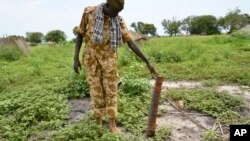As the United States considers lifting sanctions on Sudan, one of the most sensitive issues is on display in these tense borderlands: weapons. South Sudan's government accuses its neighbor of supplying arms to rebels fighting its bloody civil war.
On a visit last month, The Associated Press spoke with opposition fighters who recently defected to the South Sudan government side. They described how weapons flow in from Sudan - and how rebels flee there to find safe harbor.
Past documentation by arms experts that Sudan has supplied weapons to South Sudan's rebels are a concern as the Trump administration considers permanently lifting sanctions on Sudan in October. The sanctions have been in place for two decades because of grave human rights concerns.
Sudan's government has denied arming the rebels. Human rights groups say that if it is happening, Sudan's actions should weigh heavily against lifting sanctions.
“If Sudan can't restrain itself from destabilizing its southern neighbor when it has so much to gain from the United States by not doing so, imagine the damage Sudan will do once sanctions are lifted and the U.S. no longer has leverage on Sudan to temper its worst instincts,” the founding director of the Enough Project, John Prendergast, told the AP.
Tens of thousands of people have been killed in South Sudan's four-year civil war and millions have fled the country. Multiple efforts at peace deals have failed and no end to the conflict is in sight.
Between 2011 and 2015, the independent organization Conflict Armament Research documented Sudanese support to opposition forces in South Sudan. It found that Sudanese military equipment had been “captured from non-state armed groups” there. It also found that Sudan often repackaged ammunition or masked shipping information to conceal its origins, especially with large quantities of Chinese ammunition.
However, experts say that since 2015 there have been no new findings to support the claims of Sudan arming South Sudan's rebels, adding that proving any recent transfer is extremely difficult.
“The U.S. put a lot of pressure on Sudan last year to cut off support to South Sudan's rebels” as it explored whether to lift sanctions, said Alan Boswell, a conflict analyst specializing in South Sudan. The rebels then lost significant ground after struggling to resupply, Boswell said.
In the past year, despite South Sudan declaring a unilateral cease-fire, government forces have launched offensives reclaiming most of the West Bank in Upper Nile state, an epicenter of the civil war. Government troops have pushed the rebels further north.
In two towns the AP visited along the border with Sudan, mounds of bullets and explosives were seen piled on the ground or buried in holes to limit the damage from accidental explosions. South Sudan's army says the arms come from Sudan and were captured from the rebels - but the army also loads its own guns with the ammunition.
“Sudan is giving the opposition military equipment and everything they need,” said Col. James Gatjiath, the army commander in Northern Upper Nile state. Government troops in June captured two tanks from the opposition that he said came from Sudan.
Shown photos of the piles of ammunition, the coordinator of the U.N. panel of experts monitoring sanctions on South Sudan, Klem Ryan, said he agreed with arms experts that “this stuff has mostly been in country for at least a couple of years. And it's impossible to say how any group comes by it.”
The AP spoke to three rebel defectors in Wadakona town. Each said roughly 8,500 rebel fighters were based in two towns on the Sudan side of the border.
“They gave us AK-47s, machine guns and artillery,” John Bier, a defector-turned-South Sudan government soldier, said of the Sudanese. Bier said he fought with the opposition for four years was based in Sudan for most of that time.
“There's a contract in place between Machar and Khartoum,” said Sebit Kong, another rebel who recently defected. He was referring to opposition leader Riek Machar, now in exile in South Africa. “Machar says, `Give me everything I need and I'll pay you back once we kick them out.”'
The opposition rejects the claims that Sudan is supplying it with weapons.
“I wish that was true. We could be in Juba by now,” said opposition spokesman Lam Paul Gabriel, referring to South Sudan's capital. “We get our supply [of weapons] from the Juba regime's untrained forces in battles.”
The State Department says the U.S. will continue to urge Sudan's government “to maintain cooperation with the United States on addressing the South Sudan conflict and seek to stop the historical patterns of retributive, proxy support provided by both Sudan and South Sudan to armed opposition groups in each other's territory.”





